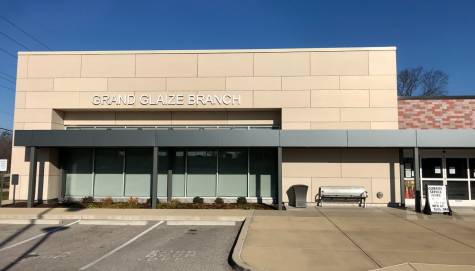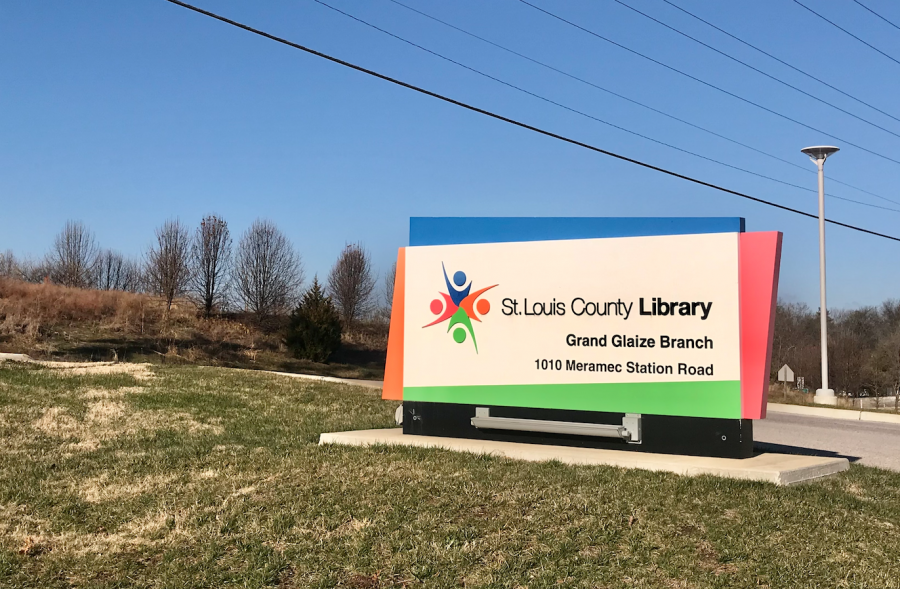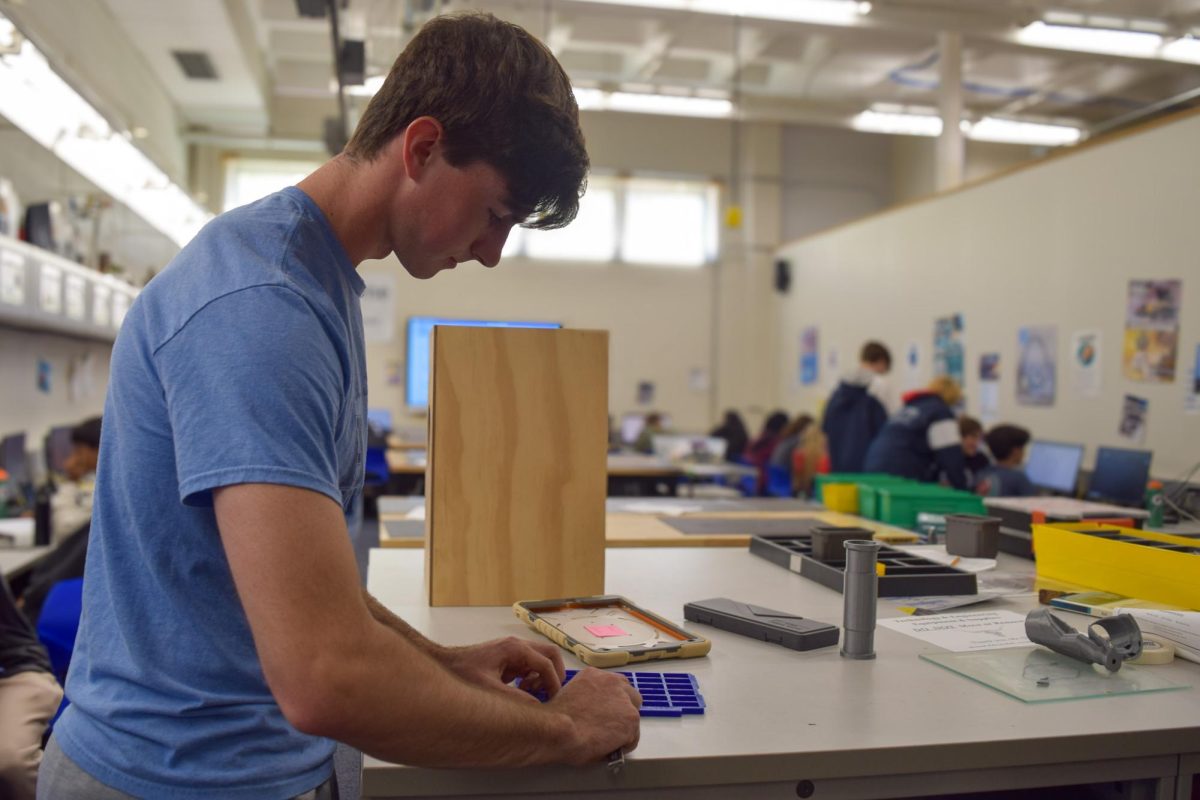From offering books to hosting events to giving out after school meals, St. Louis County Libraries (SLCL) can be important and meaningful community spaces. For many patrons, they are places that nurture curiosity and valuable experiences.
But librarians with Libraries for All STL say some users are often deprived of the holistic library experience. Inspired by the summer’s uprisings against policing, the group is working to make libraries safer and more welcoming for all members, particularly Black youth. *Two Libraries for All STL members spoke to the Pathfinder and requested to stay anonymous. Their names have been changed.
“What we saw is that police are creating a barrier for people to safely and freely engage with all aspects of the library,” Ashley, an organizer with Libraries for All STL and current library employee, said. “Whether it’s a place to hang out, a place to study, to get on the computers, to check out some video games–whatever it is, we want people to know that they have a right to be at the library. We have great programs [and] so many resources, and we want the most people to benefit from the resources, the most people in our region to have access and to feel welcome.”
At first, individual librarians felt afraid to speak out. They did not want to rock the boat or risk losing their jobs. But as they began talking with one another, some staff members realized they were not the only ones who saw a problem. From these conversations, Libraries for All STL was formed.
“We were responding to the uprisings happening this summer for Breonna Taylor [and] for George Floyd, for Black lives in general. We were also overdue for a kind of reckoning with the ways police and policing play out in the libraries,” Ashley said. “Especially being a librarian in the St. Louis region where we’ve had the Ferguson uprising, Michael Brown, Kiwi Herring, Anthony Lamar Smith, we’ve had so many major cases here, as well as really powerful responses from the community and organizing for Black lives. We saw ourselves saying ‘how can we take up the call to defund the police in our own circles and in our own spaces?’ and that looked like our workplace.”
The group is composed of current and former library employees and partners with other organizations like Action St. Louis, West County Community Action Network and Cop Free Library NYC. They took issue with the library’s security budget, specifically the $587,852 contract with Hudson Services, a company that provides library branches with off-duty St. Louis County Police Officers. Those armed and uniformed officers, organizers say, work in six specific branches: five in North County and one in South County, all of which serve majority non-white communities. In majority-white branches, no officers are allotted.
“Police who come into the library have a tendency to incite fear in certain populations [like] Black people [and] undocumented people who utilize the library probably more than anybody else due to financial reasons or economic insecurities,” Amara, a second library employee and member of Libraries for All STL said. “They should be able to come in[to] the library and feel comfortable, hence our name Libraries for All. We’re just trying to make the library a safe haven for everybody and not just certain parts of the population.”

The group also noticed a correlation between branches with a police presence and branches that were serving after school meals to youth–many in areas with higher rates of food insecurity. At those locations, punishment for young kids, including being kicked out of the library, is also prevalent.
“When we create a barrier for someone coming in, we’re actually also denying potentially a meal that they may not have gotten elsewhere. I would rather see kids hang out in the library and if they’re a little loud or making a ruckus, no problem, we’ll have a conversation if it’s getting out of hand. But, there’s no reason to kick them out when this is a much safer space [than] a lot of spaces [they] could end up in after school if [they] don’t have a place to go or if home isn’t a welcoming place,” Ashley said. “In my experience, I was seeing 12 and 13 year olds be punished [by officers]. It’s a psychological harm for young people to come into the library, which is supposed to be a welcoming, educational and fun place, and [if] you’re bombarded by an armed police officer when you walk in [it’s] just really intimidating and hurtful.”
Young library users, however, are not the only ones feeling unsafe. Many library workers and community members who attended Black Lives Matter protests over the summer say the presence of police officers in libraries created an uncomfortable environment for them.
“This summer, there were uprisings in St. Louis and the same officers who were going out and pepper spraying people at night came in the next day to work with us. They don’t recognize us, but we recognize them [and] it’s definitely disheartening to come to work and see people who terrorize you outside of work. Even if you’re not working at the library, protesters have the right to come to the library and feel safe,” Amara said.
Demands and wins:
Initially, the group’s advocacy in late June only took place internally, but organizers expanded their efforts and called on the broader community for support. In response to staff activism, the library hired a third party to host virtual “Black Lives Matter Town Hall” meetings for staff, but the campaign only continued growing. At the Board of Trustees meeting in July, 38 public comments were submitted backing the group’s demands, with over 100 read in later meetings. A few days after, 122 library employees were fired. Library Director Kristen Sorth said the move was a result of lower community use of the libraries and in order to be “good stewards” of taxpayers’ money. That is when Libraries for All STL formally submitted a petition to the library administration and board with five main demands.
Six weeks after they sent the petition, Sorth and the Board acknowledged the letter and committed to one of the demands by publicly stating Black Lives Matter in a local newspaper ad. But it was not until Oct. 12 that the group learned of a major win for their movement.
“We put in a lot of work and we’re really proud of everything the community did with us–public comments, our petition that had 1200 signatures–that was pressure from the community and from our organizing, so we’re really proud of what we can do. It shows how powerful we are, and how much we’ve accomplished in a very short time,” Ashley said.
One of their main demands–termination of contracts with police officers–was answered. With the exception of the Indian Trails branch which will see full divestment from policing, the other five branches will replace officers with internal security employees.The library announced its plans to contract social workers, provide staff de-escalation training and raise the minimum wage to $15 an hour for all staff in 2021. But, organizers say the work is not over yet.
“We are definitely excited by everything that is changing. It does give us motivation to keep trying for change. But one of my biggest things is getting these people their jobs back and since that demand has not been met, I’m not satisfied yet,” Amara said. “These are people with children. Jobs are scarce. It’s hard to start a new job during COVID age. It felt really really insensitive for them to at this time send people closer to complete financial ruin. I’m sure that losing a job definitely affects these people’s lives in unbelievable ways. That’s what makes it hard for me to celebrate. I’m not done yet.”
Next steps and community support:
The group has faced opposition from library administration and community members. However, they remain committed to their vision of divestment.

“People are really upset about saying ‘defund the police,’ but they’ve already defunded our education system. They’ve already taken our money and handed it to the police. All we’re asking them to do is redirect the money back where it should be,” Amara said. “We’re asking for social workers, instead of police, who can help some of the homeless population who come into our libraries and get put out at an abnormal rate. We’re asking for de-escalation training so that we as librarians feel safer handling the situation, as opposed to handing it off to police officers who may or may not take things too far. We’re just trying to find different solutions, as opposed to asking the police to solve things that they are not trying to solve.”
They are looking to the local community, particularly young people, to keep the pressure on the library’s board. Some of the other demands they are hoping to achieve include rehiring fired workers, establishing a participatory budgeting process and restructuring the library administration. Libraries for All STL encourages student participation in their movement.
“I really do think students are the voice that could push this over the edge, because you guys are the people we should be catering to. Our kids don’t get to have a say in the things. The board gets to make decisions about your lives without you at the table. That’s not acceptable. So we want to amplify your voice. Get active, because that’s the only choice. You have got to get active,” Ashley said.
They are also pushing the library administration to create a Youth of Color Advisory Board. Modeled after Indigenous youth councils in some Canadian libraries, the Council aims to engage youth in policy making at SLCL.
“We have things like Teen Advisory Groups [that] typically get to help plan programs that are interesting to them. We love the TAG teens and we want them at every branch. But a Youth of Color Advisory Board would work like a Board of Trustees to give [youth] a real say, particularly youth in North County, because those are the teens who continue to be punished by the policies the libraries had,” Ashley said. “Let’s do some repairing of that relationship.”
With the final Board of Trustees meeting of the year scheduled for Dec. 21, in which the 2021 budget will be finalized, Libraries for All STL encourages community members to submit public comments in support. They also ask allies to talk to their family members or write letters to the editors in local publications. More so, they invite anyone interested in volunteering or having a conversation with the group to reach out.
“The move that really shakes the board up is when the community starts talking. They can ignore us, they can fire us. But once we get this movement into the community, it becomes a part of what everybody in our community is working towards,” Amara said. “A lot of people are saying that what we’re doing is because we don’t love the library, and the fact of the matter is that what we’re doing is because we love the library so much, because we believe in what it could be, instead of what it is right now. We’re just asking the library to reach its higher self.”
If you would like to get in touch with Libraries for All STL, you can reach out to [email protected].




![Focused on providing exceptional service, sophomore Darsh Mahapatra carefully cleans the door of a customer’s car. Mahapatra has always believed his customers deserve nothing less than the best. “[If] they’re trusting us with their car and our service, then I am convinced that they deserve our 100 percent effort and beyond,” Mahapatra said.](https://pwestpathfinder.com/wp-content/uploads/2025/10/DSC_0018-1200x800.jpg)
![Sophomore Aleix Pi de Cabanyes Navarro (left) finishes up a soccer game while junior Ava Muench (right) warms up for cross country practice. The two came to Parkway West High School as exchange students for the 2025-2026 school year. “The goal for the [exchange] program is to provide opportunities for both Parkway students and our international exchange students to learn about other cultures, build connections and become confident, capable, curious and caring — Parkway’s Four C’s — in the process,” Exchange Program Lead Lauren Farrelly said.](https://pwestpathfinder.com/wp-content/uploads/2025/10/Feature-Photo-1200x800.png)

![Gazing across the stage, sophomore Alexis Monteleone performs in the school theater. The Monteleone family’s band “Monte and the Machine” has been releasing music since 2012, but Alexis started her own solo career in 2024 with the release of her first single, Crying Skies. “My whole family is very musical, [and I especially] love writing [songs with them],” Monteleone said.](https://pwestpathfinder.com/wp-content/uploads/2025/09/DSC7463-1200x798.jpg)
![Amid teaching a lesson to her AP Calculus BC class, Kristin Judd jokes alongside her students in their funny remarks. Judd has always enjoyed keeping the mood light in her classroom, along with on the volleyball court. “[I enjoy] that side talk where you see [or] overhear a conversation and chime in, or somebody says something funny,” Judd said.](https://pwestpathfinder.com/wp-content/uploads/2025/09/image-1200x730.jpg)
![Eyeing the ball, junior Ella McNeal poses for her commitment pictures at Clemson University. McNeal’s commitment comes after months of contact with top Division 1 soccer programs. “ It has taken a lot to get to where I am, but I know that [what] I've already been through is just the beginning, and I can't wait for what is to come,” McNeal said.](https://pwestpathfinder.com/wp-content/uploads/2025/09/IMG_4926-1200x900.jpeg)


![Senior Adam Zerega stands with senior Dexter Brooks by farm equipment. Zerega often worked with friends and family on his farm. “I've been able to go to my family's farm since I was born. I [spend] at least three weekends a month [on the farm], so I'm there all the time,” Zerega said.](https://pwestpathfinder.com/wp-content/uploads/2025/04/IMG_4872-1200x900.jpg)

